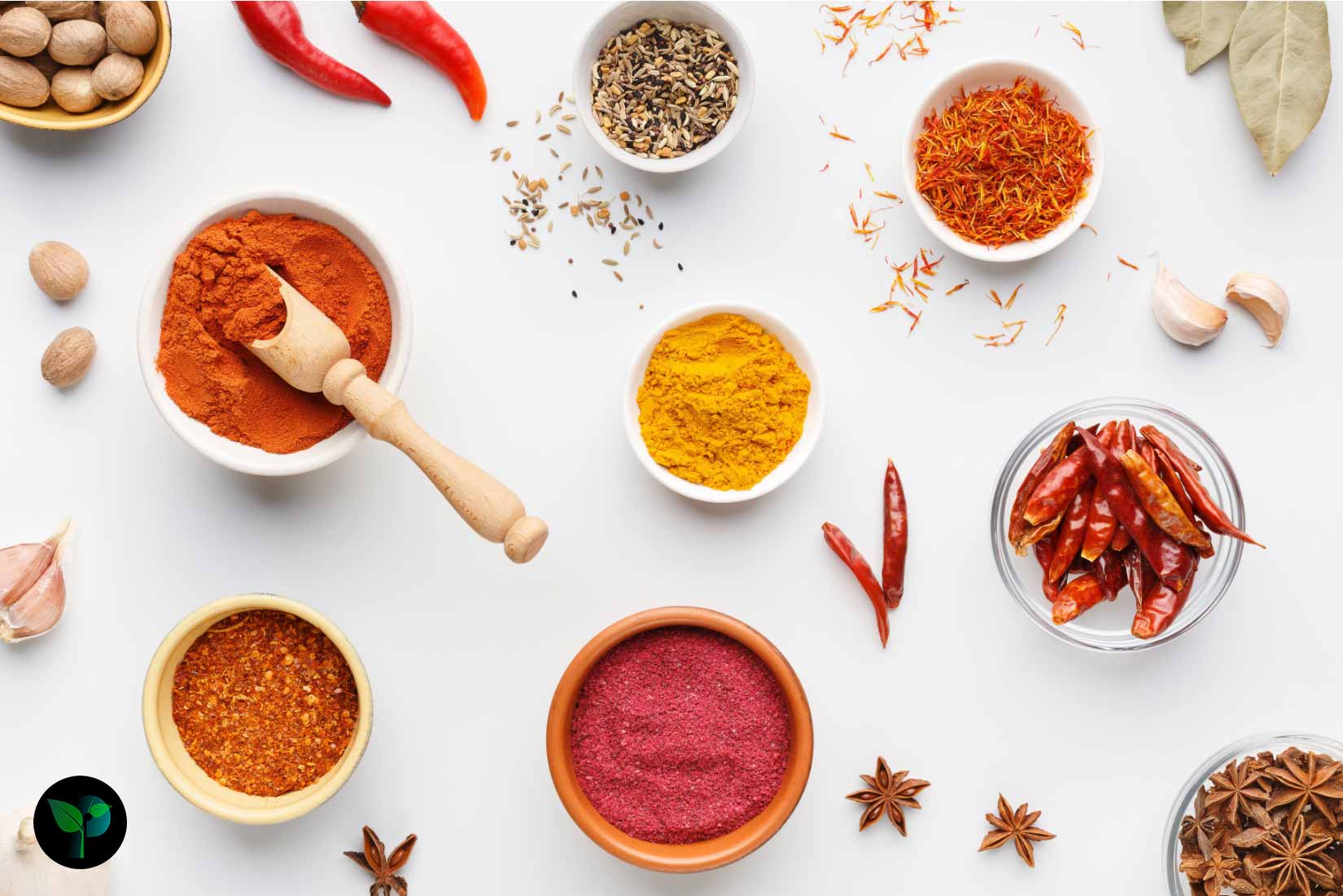More than 10 medicinal herbs can be used as spices in various foods. Some of the most common include turmeric, cinnamon, pepper, and cumin. These herbs have been used in popular foods in Asia, Europe, and other parts of the world for centuries. In addition, the following herbs (or their extracts and powders) can be used as flavorings and spices in food and beverages:
- Garlic powder
- Saffron
- Dried parsley
- Mint extract or powder
- Rosemary extract
- Basil and fenugreek
- Fenugreek seed extract or powder
- Ginger
Recent scientific studies have shown that each of these herbs and spices has unique properties for controlling and treating chronic and seasonal diseases. Therefore, in the following, we have tried to mention a few of them and their properties for promoting human health and preventing or controlling diseases, according to the latest scientific findings:

Medicinal Herbs and Spices
Cinnamon
Cinnamon and its powder are spices which used in many cooked foods. You can also consume it with hot and cold drinks such as tea, coffee, or with milk. But the interesting point is that cinnamon has anti-diabetic properties. This spice contains a unique compound called cinnamaldehyde, which contains many of the medicinal properties of cinnamon. Although the properties of cinnamon on human health are very high, studies show that its greatest effect is on controlling blood sugar levels. These compounds reduce the breakdown of carbohydrates in the body, leading to lower blood sugar levels.
Cinnamon’s Effects
Several studies conducted in recent years have shown that cinnamon can help to reduce blood sugar levels in people with diabetes by 10 to 30 percent.
What is the appropriate dose of cinnamon as a medicinal herb?
One important question that needs to be answered is how much cinnamon should be included in the diet (in order to have a positive effect as a medicinal herb). It seems that in many patients, consuming 2 to 6 grams of cinnamon daily can have a positive effect. This is equivalent to 1 to 3 teaspoons of ground cinnamon.
Turmeric
Turmeric is an essential part of many spice blends that have been used for centuries around the world. The most well-established effect of this spice is its anti-inflammatory effects in the human body. These effects are due to an antioxidant compound that helps to boost the immune system and fight inflammation and other physical problems. In fact, consuming turmeric is as effective as taking chemical anti-inflammatory drugs.
Some of the benefits of consuming turmeric include
- Improved brain function
- Reduced risk of Alzheimer’s disease
- Reduced risk of heart disease
- Cancer prevention
Mint
Mint is one of the vegetables that can be used with food. For example, you can use mint as a flavoring in yogurt. This medicinal herb has a wonderful effect on improving inflammation and reducing pain in the intestinal area. Therefore, it is recommended for improving the symptoms of digestive problems. In addition, a study on over a thousand people showed that the smell of mint can help to reduce nausea after surgery or after the birth of a baby in pregnant women.
Basil
Basil is another vegetable that can be used as a spice or medicinal herb. Using basil is helpful for fighting infection and helps to boost the immune system. You can use it with some foods. It is interesting to know that a known species of basil is considered sacred in India due to its unique properties. Reducing anxiety and depression or reducing blood sugar are among the other benefits that will be observed in the human body after consuming basil with food.
Of course, more research is needed to determine the appropriate dose of basil (to maximize its use to prevent the growth of bacteria or other benefits).
Ginger
Ginger has anti-inflammatory and nausea-reducing properties, which are some of its most important medicinal properties. You can use ginger and cinnamon in many cooked dishes. Using them in herbal teas or with dairy milk will improve your health. Reducing inflammation of the digestive system and reducing the risk of colorectal cancer are among the benefits of consuming ginger. It is interesting to note that consuming ginger with cinnamon and sesame oil may have a somewhat similar effect to taking common medications or pills such as:
- Aspirin
- Ibuprofen
Of course, it is better to add some mastic or Roman chamomile to the combination of cinnamon, ginger, and sesame oil to increase its effect.
Fenugreek
Some people use fenugreek to boost sex drive or improve fitness. Although the effect of fenugreek on sex hormone levels and testosterone is not well understood, it may be considered one of the best herbs that can be consumed as a spice to control blood sugar levels. Improved insulin hormone function with fenugreek consumption is due to a specific compound in it that has been studied in several studies.
How much fenugreek is recommended to consume?
About a few grams of fenugreek or its extract, daily, can show its positive effects in the body. Of course, fenugreek seeds can also be powdered and used as a spice with turmeric.
Rosemary
There is an active ingredient in rosemary that can help improve allergy and reduce nasal congestion.
Dosage
Consumption of less than one gram of rosmarinic acid (about 100 to 200 milligrams) has shown its positive effect in a study on patients with allergies.
Garlic powder
Garlic powder can be used as a spice with fish or some cooked dishes. The medicinal properties of this powder for fighting various diseases (such as colds) have been shown in several scientific studies. In addition, consuming garlic powder can have the following benefits:
- Reducing the risk of heart attack
- Reducing LDL cholesterol by 10%
- Reducing blood pressure



Leave a Reply